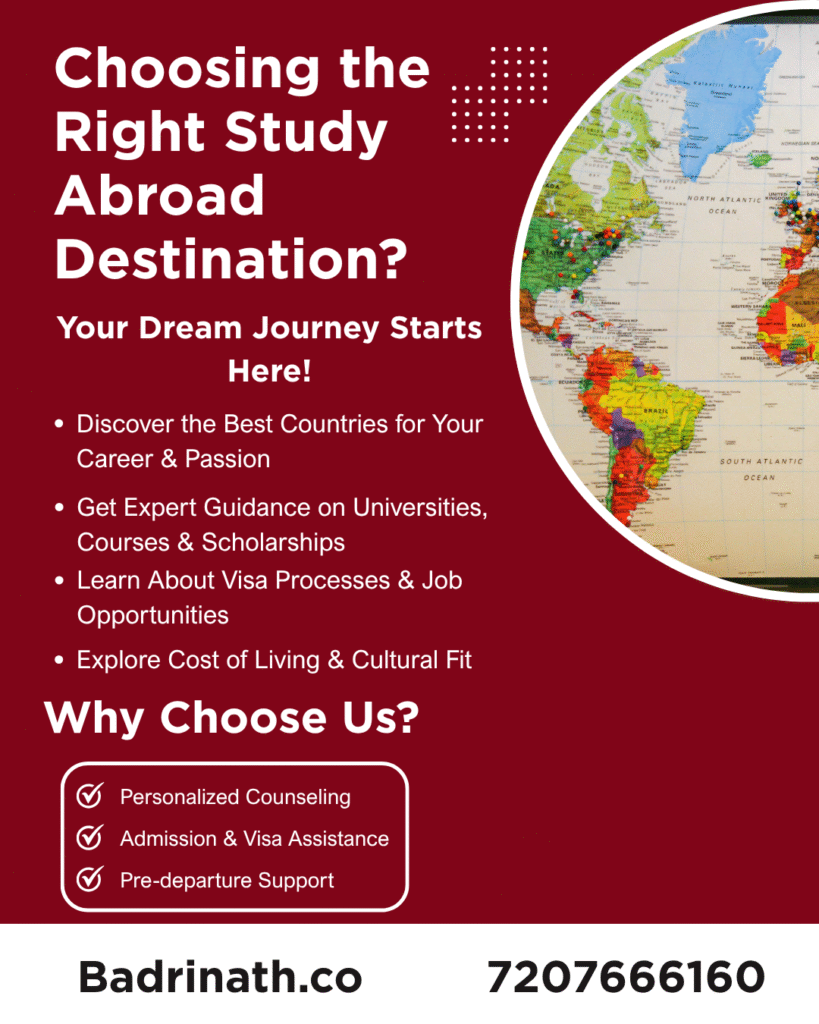Introduction
Think about standing at a crossroads, where each path leads to a different country, a new culture, and a journey that could change your life forever. That’s exactly what it feels like when you’re choosing where to study abroad—it’s a decision that can shape your education, career, and even your personal growth. Sounds overwhelming, right? But studying abroad isn’t just about pointing to a spot on the map. It’s about choosing a place that truly matches your dreams, your budget, and your long-term goals. Maybe you’re aiming for a top-tier education, better job opportunities, or simply craving an unforgettable adventure. No matter what drives you, the place you choose can open amazing doors—or sometimes, close them.

Whether you’re drawn to the buzzing energy of London or the peaceful charm of Canada’s university towns, your decision affects so much: the quality of education you’ll get, how much it’ll cost to live, the people you’ll meet, and even how happy and comfortable you’ll feel along the way. Pick the wrong spot, and you might find yourself stressed, struggling financially, or stuck in a course that doesn’t inspire you. That’s why this guide is here—to help you figure it all out step by step. We’ll explore the most important things to think about so you can make a choice that truly matches who you are and where you want to go in life. So grab your favorite drink, get comfy, and let’s get started!
Academic Goals and Program Availability: Align Your Destination with Your Dreams
First things first: what are you interested in studying, and where would be the best place to do so? Every nation has unique educational advantages, and choosing a study abroad destination greatly depends on your area of interest. For instance, if you’re interested in technology and innovation, countries like the USA, Germany, or Singapore offer cutting-edge programs. For fashion and design, Italy or France might top your list. Business and finance? The UK, Canada, or Australia. Before you get caught up in the excitement of living abroad, research the universities and programs that align with your career ambitions. Look into:
- Global university rankings in your field
- The structure and content of the course
- Internship and research opportunities
- Industry connections and employability after graduation
Also, check if your degree will be recognized and valued back home or in the country where you wish to work in the future. It’s not just about the prestige of the university—it’s about how the degree serves your long-term goals. Another often-overlooked factor? Language. Studying in a language you’re comfortable with (or willing to learn) can significantly affect your academic performance and social life. So, think twice before enrolling in a program taught in a language you barely speak. Remember, your Study Abroad Destination should not only excite you but also serve your academic and professional objectives.
Cost, Scholarships, and Lifestyle: Make It Financially and Personally Sustainable
Money matters. Let’s face it: studying abroad can be expensive, and financial planning is a huge part of choosing the right Study Abroad Destination. The cost of living, tuition fees, travel expenses, and even currency exchange rates can make or break your study abroad dreams. For example, tuition in the USA or UK can be significantly higher compared to countries like Germany, where some public universities offer free or low-cost education. Similarly, the cost of living in Scandinavian countries is generally higher than in Eastern Europe or parts of Asia.
Here’s what to factor in:
- Tuition Fees: Public vs. private institutions, scholarships, assistantships
- Cost of Living: Accommodation, food, transport, healthcare
- Work Opportunities: Can you work part-time? What are the wages?
- Financial Aid: Check for government-funded scholarships, university-specific grants, or international scholarships like Erasmus+, Fulbright, or DAAD
Lifestyle is just as important. Do you thrive in a fast-paced city or prefer a quiet town? Are you comfortable with the local culture, food, and climate? Your personal well-being will affect your academic success, so choose a Study Abroad Destination where you can feel at home. Think about social life, extracurriculars, travel opportunities, and even how far you’ll be from family and friends. If you’re not happy outside the classroom, your studies will suffer too.
Career Prospects and Immigration Opportunities: Think Beyond Graduation
Studying abroad isn’t just about earning a degree—it’s a stepping stone to your future career. This is why career prospects and immigration possibilities should be on your checklist when selecting your Study Abroad Destination.
Many countries offer international students pathways to stay and work after graduation. For instance:
- Canada: Post-Graduation Work Permit (PGWP) allows students to work up to three years after finishing their studies.
- Australia: Temporary Graduate Visa (subclass 485) offers similar work rights.
- UK: Graduate Route Visa permits two years (three for PhD holders) to stay and work.
- Germany: International graduates can extend their stay to search for a job.

Before you pick a destination, explore:
- The job market in your field
- Visa and post-study work policies
- Opportunities for internships and networking
- Alumni success stories
If your goal is permanent migration, some countries offer points-based immigration systems that reward foreign graduates. Others may have more challenging visa pathways, so it’s wise to plan ahead. Also, consider global recognition of your degree. Studying in countries with globally respected education systems can increase your chances of employment not just locally, but worldwide. A great Study Abroad Destination is one that not only helps you earn a degree but also paves the way for a successful career and fulfilling life after graduation.
Conclusion
Choosing the perfect Study Abroad Destination is like assembling a puzzle—each piece matters. It’s not just about the glamour of living abroad; it’s about making a choice that aligns with your educational goals, financial reality, personal happiness, and future career.






